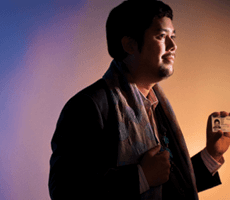Identifying Progress
Staffer Receives First Official Gender-Neutral Driver’s License in U.S.

John T. Consoli
John T. Consoli
For most people, renewing a driver’s license is drudgery, defined by long lines, drab surroundings and interminable waits.
But for Nic Sakurai, acting director of UMD’s LGBT Equity Center, the occasion was a proud one. In June in Washington, D.C., Sakurai received the country’s first official gender-neutral driver’s license—a goal that Sakurai, who identifies as neither a man nor a woman and uses the pronoun “they,” had long hoped to achieve.
“It’s a validation that my government sees me—that the place where I live recognizes that I exist and that I shouldn’t have to show an ID that’s not true to who I am,” says Sakurai.
Sakurai’s new license lists an “X” instead of an “M” or “F,” denoting “unspecified” or “other.” D.C. isn’t the first jurisdiction to issue gender-neutral official documents—New Zealand, Australia, Canada, India and other countries offer identification documents with options beyond simply “male” or “female”—but it was the first in the U.S. to legally offer the choice on driver’s licenses. Oregon now has a similar policy, and New York and California are in the process of considering policies, as well.
Sakurai was inspired partly by similar efforts of genderqueer individuals in other states. Sakurai met with lawyers from the National Center for Transgender Equality and D.C.-based Whitman-Walker Health to discuss how to present the idea to the D.C. Department of Motor Vehicles. In March, Sakurai and their lawyers met with Lucinda Babers, director of D.C.’s DMV, only to discover that gender-neutral IDs were already part of the department’s plan.
“It was really exciting to learn that we didn’t really have to fight on that,” says Sakurai.
Still, the Sakurai team helped D.C. hammer out some details, and also pushed for another switch: that gender be self-designated, a departure from the previous policy, which required the approval and signature of a health care or social services provider before changing genders on an already-existing license.
“It’s a really important acknowledgement that individuals themselves are the ones who know their gender identity and are best-suited to report it and know what’s safest and most accurate for them,” says Arli Christian, state policy counsel at the National Center for Transgender Equality, who worked with Sakurai and D.C.’s DMV.
To some, this is a watershed moment for gender-variant people nationwide. “The District has set the new gold standard for access to accurate gender markers on identification documents in the United States,” Mara Keisling, executive director of the National Center for Transgender Equality, told CNN.
For Sakurai, who came out as gay and bisexual while attending an all-boys Catholic high school in the Cincinnati area and later as gender-variant, a gender-neutral driver’s license isn’t a recognition of a new phenomenon, but of an identity with a long history. “The idea of more than two genders is not new at all,” they say. “It’s not some newfangled thing.”
Sakurai, who has worked at UMD for more than seven years, was somewhat surprised by the sustained media attention around their driver’s license—including coverage in The Washington Post and on CNN—but says the response has been “overall, very positive.”
Still, some online commenters have been “super vile,” says Sakurai, who describes the situation as “don’t read the comments, but do. The reason I want to know what people are saying is that I’m an educator, and I want to be thinking about where there’s ignorance and what it looks like to try to help people understand.”
The LGBT Equity Center launched the #TransTerps campaign this fall to improve the campus climate for trans people. It includes events, training and other resources to identify, share and implement good practices for trans inclusion. For more information, visit lgbt.umd.edu/rainbow-terrapin-network-transterps.